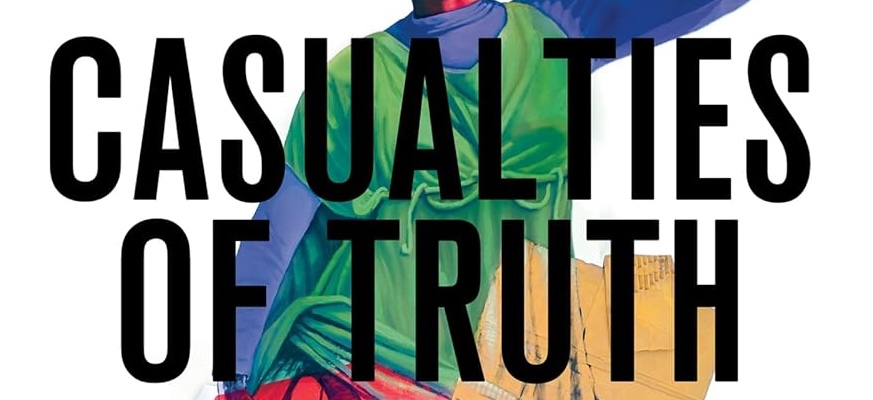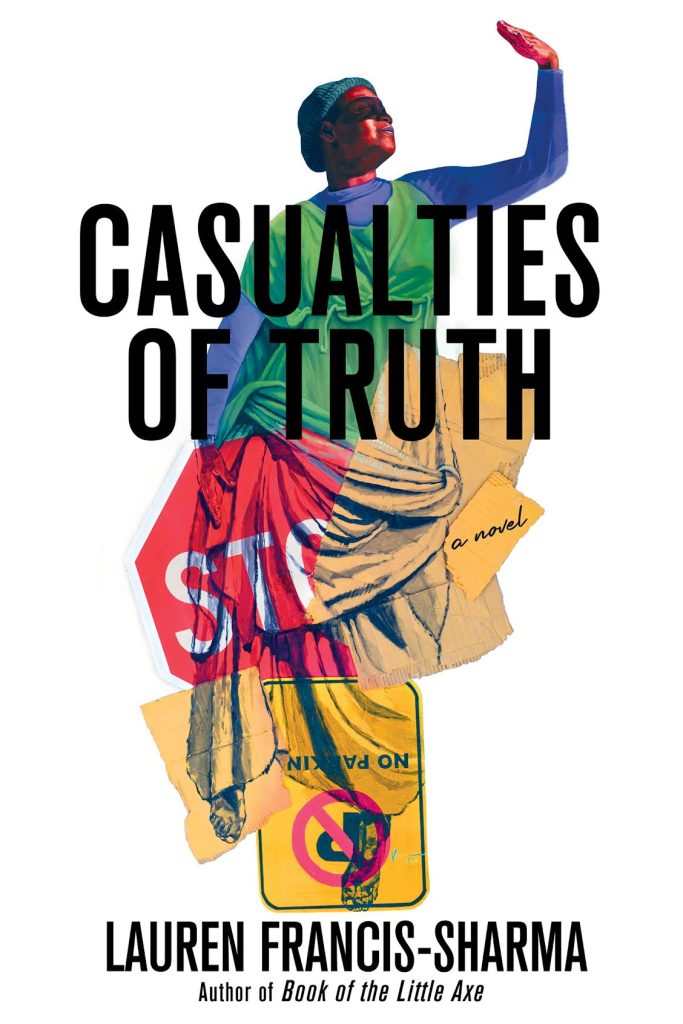Electric Literature is pleased to reveal the cover of Casualties of Truth, the new novel by acclaimed writer Lauren Francis-Sharma, which will be published by Grove Atlantic on February 11th, 2025. You can preorder it here.
Prudence Wright seems to have it all: a loving husband, Davis; a spacious home in Washington, D.C.; and the former glories of a successful career at McKinsey, which now enables her to dedicate her days to her autistic son, Roland. When she and Davis head out for dinner with one of Davis’s new colleagues on a stormy summer evening filled with startling and unwelcome interruptions, Prudence has little reason to think that certain details of her history might arise sometime between cocktails and the appetizer course.
Yet when Davis’s colleague turns out to be Matshediso, a man from Prudence’s past, she is transported back to the formative months she spent as a law student in South Africa in 1996. As an intern at a Johannesburg law firm, Prudence attended sessions of the Truth and Reconciliation hearings that uncovered the many horrors and human rights abuses of the Apartheid state, and which fundamentally shaped her sense of righteousness and justice. Prudence experienced personal horrors in South Africa as well, long hidden and now at risk of coming to light. When Matshediso finally reveals the real reason behind his sudden reappearance, he will force Prudence to examine her most deeply held beliefs and to excavate inner reserves of resilience and strength.
Lauren Francis-Sharma’s previous two novels have established her as a deft chronicler of history and its intersections with flawed humans struggling to find peace in unjust circumstances. With keen insight and gripping tension, Casualties of Truth explosively mines questions of whether we are ever truly able to remove the stains of our past and how we may attempt to reconcile with unquestionable wrongs.
Here is the cover, designed by Becca Fox:
“A departure from designing Lauren Francis-Sharma’s previous book, Book of the Little Axe, I was truly captivated by how the author toggled seamlessly between protagonist Prudence Wright’s present-day life in Washington D.C. and her unsettled past in Johannesburg, South Africa throughout Casualties of Truth,” says Becca Fox, the designer.
“A novel at its heart, the story also walks the line of a revenge thriller with deep historical roots, and it was crucial to find imagery that picked up on this energy. While doing extensive research, I was immediately struck by Vivien Kohler’s Of Reason and Requiem, which felt like a South African ‘Lady Liberty’ to me. With the artist’s permission, we were able to recolor the illustration to harken back to the South African flag while also paying homage to modern-day America. The embedded street sign iconography also lent itself well to the story (without giving too much away!) — you always dream of happy coincidences like that as a designer. I was also drawn to working with a condensed typeface like Akzidenz Grotesk that felt as bold and fresh as the story to round out the design.”
“She looks a bit like lady liberty, doesn’t she? My editor nodded in agreement. She’s got that high tilt in her chin, that erect pose, those soft folds of fabric beneath her waist….but is she the right cover?
Having spent time in South Africa, I was certain the artist designing the proposed cover for my latest novel, Casualties of Truth, was someone who understood the aesthetics of the country. And yet, my novel isn’t just about South Africa. It is a diasporic novel that shows the interconnectedness of people in the struggle for freedom, a novel about hidden pasts, a novel about motherhood and marriage, and yes, too, a novel about Apartheid and the post-Apartheid era. But my protagonist, Prudence, lives a life far from the one the woman on the cover appears to live. Prudence is a Harvard Law and Business School graduate, a former McKinsey consultant, a woman who can afford to stay home to care for her autistic son. And she is also frightened. When a man she met in Johannesburg over twenty-years earlier is introduced as her husband’s new colleague, Prudence finds herself unraveled by thoughts of what she could lose at this man’s resurfacing.
The novel is a fast-paced ride through Baltimore, Johannesburg, Trinidad, and the Maryland suburbs of Washington, D.C. So, what cover might capture these places, might capture over forty years of one woman’s life? I wasn’t sure, but when I looked at my “Lady Liberty,” I could see triumph in the colors of the South African flag. Living in South Africa in 1996, only two years after the flag’s unveiling, I remembered hearing the joke about how the little strip of yellow in the flag represented all the electric fences whites were putting up to keep Blacks out. But this wry humor isn’t notable in my Lady Liberty’s proud face, a face she seems intent on shielding from some terrible glare. Is it the sun boring down on her or something else? And what of the sign at her hip? Is the reader to understand the traffic signs—STOP and NO PARKING—to be warnings about Prudence’s impending journey? And what of her bare feet? Are they a sign of struggle or of comfort? Will a reader turn away from them or are they an invitation to remove one’s shoes before entering a welcoming place to hear a gripping tale? My Lady Liberty stands alone in the midst of a stark white space, hyper-visible, and still, what remains for me is the most important question of all—will readers be curious enough to reach for her?
My Lady Liberty stands alone in the midst of a stark white space, hyper-visible.
In early 2024, I flew to South Africa for the final bit of research I needed for the novel. I had been searching for a recorded testimony for one case in particular that I’d transcribed onto notepads which I had been carrying around for nearly thirty years. I still knew the story from memory: a group of boys betrayed by a Black state operative, an askari, who promised to take them for resistance training with the ANC, and the boys never made it home. I had seen those boys’ mothers at the hearings, I had wept for them all, and had never forgotten them.
As is often the case with research, it would take being on the ground to find people who would invest enough in your work to assist. It would be a random trip to Freedom Park in Pretoria where I would meet a guide, Badresh Kara, who would send me the link for the recording I’d been hoping to find for years. So excited and finally relaxed enough to be a tourist, I spent the next afternoon wandering Johannesburg art galleries with a dear friend, looking for inspiration for my cover. We landed at Gallery Momo, where my friend introduced me to the owner, Monna Mokoena. He told me about their U.S. residency program and about some artists he’d be featuring later in the year, the kind of work I described I might be interested in seeing. Let’s keep in touch, he said. But I didn’t keep in touch.
After weeks of mulling over the decision, I finally told my editor I was ready to finalize my choice. My Lady Liberty had been haunting my dreams, her pursed lips like an admonishment.
A few days later my editor sent a link with the name of the artist whose work had inspired the cover. Vivien Kohler. I found a few videos about Kohler and as I watched them, something in the background of one of his art shows rang familiar. I sent the link to my friend. Is this the same gallery we visited?
It is…. she wrote back.
Lady Liberty and I had crossed the same paths albeit at different times. Yet, now we had arrived at the same place together, ready to share a story that crosses time and continents to reveal our common humanity, our common desires. Mere coincidence? Perhaps. But I don’t believe in coincidences. Rather, I believe we must always be reading the world for signs of truths yet to come.”
Take a break from the news
We publish your favorite authors—even the ones you haven’t read yet. Get new fiction, essays, and poetry delivered to your inbox.
YOUR INBOX IS LIT
Enjoy strange, diverting work from The Commuter on Mondays, absorbing fiction from Recommended Reading on Wednesdays, and a roundup of our best work of the week on Fridays. Personalize your subscription preferences here.

